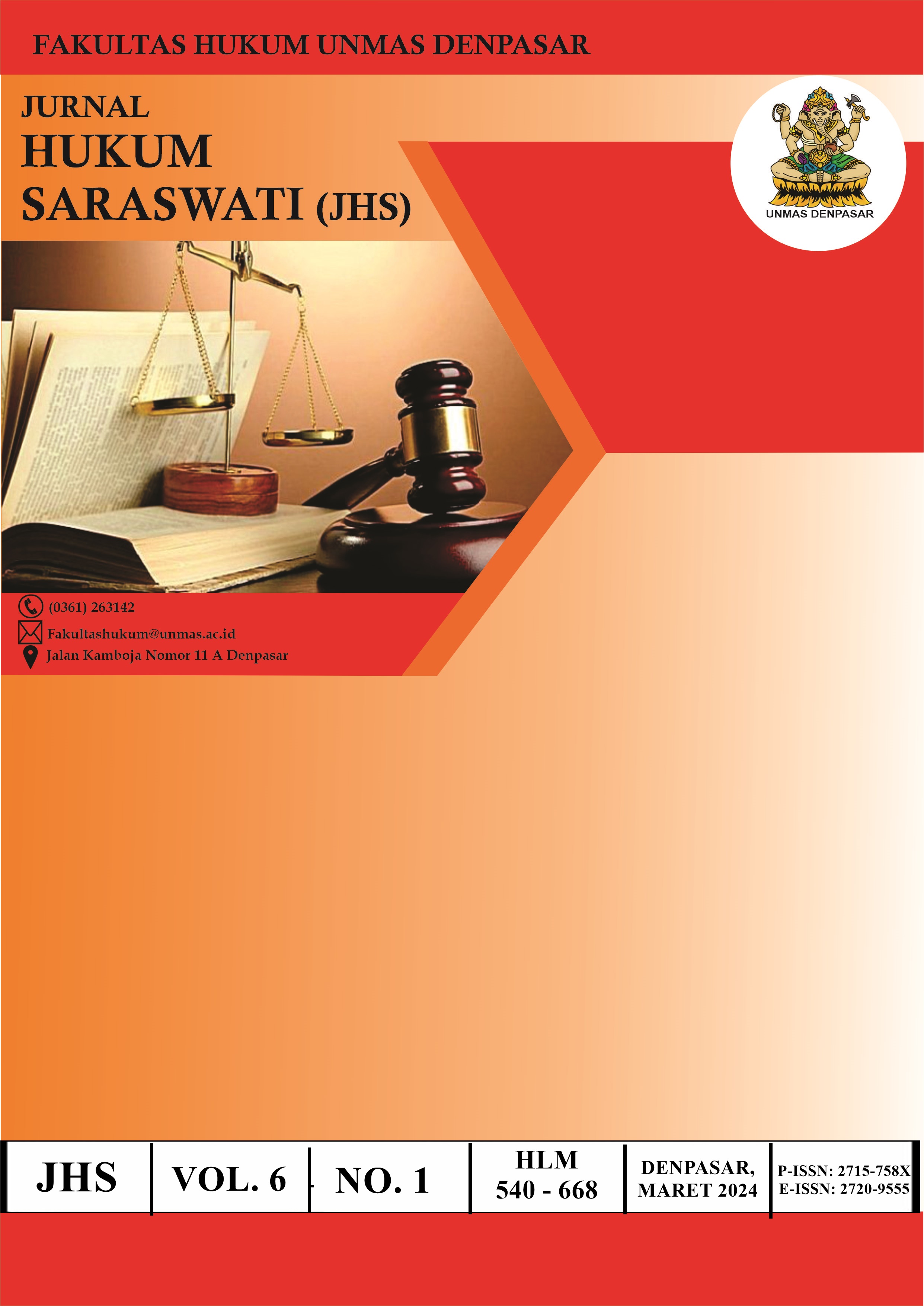Kekuatan Pembuktian Alat Bukti Keterangan Terdakwa Dalam Persidangan Online
DOI:
https://doi.org/10.36733/jhshs.v6i1.8820Keywords:
Evidence; Defendant's Statement; Online TrialAbstract
law enforcement officers. Trials usually held face-to-face in the courtroom have changed to online via video conference due to the implementation of health protocols to maintain distance. The defendant and the defendant's legal advisor in several cases refused online trials. The problem in this research is the strength of evidence and legal certainty of the defendant's testimony in online trials. There are several things that form the basis, including the Criminal Procedure Code, criminal case evidence, criminal law evidentiary theory, legal certainty theory and online trials. This research chooses to use normative juridical research methods through a statutory approach (The Statute Approach). Legal materials come from secondary data collected using the Snow Balls Method and then sorted into primary, secondary and tertiary legal materials. The results of this research are that the evidence of the defendant's statement provided electronically has the same strength as an offline trial and the legal certainty of the defendant's statement in the online trial is guaranteed by statutory regulations. Online meetings provide an expanded interpretation of space that is not limited to direct physical face-to-face meetings but also face-to-face in cyber/virtual worlds, not limited by distance and place. The laws and regulations governing the Supreme Court provide space to establish Supreme Court Regulations to regulate Criminal Procedure Law when these provisions are not yet regulated in the Criminal Code.
References
“Metodologi Penelitian Hukum sebagai Instrumen Mengurai Permasalahan Hukum Kontemporer,” Jurnal Gema Keadilan, 7.1 (2020), 20–33 <https://doi.org/10.14710/gk.7.1.20-33>
Irfani, Nurfaqih, “Asas Lex Superior, Lex Specialis, Dan Lex Pesterior: Pemaknaan, Problematika, Dan Penggunaannya Dalam Penalaran Dan Argumentasi Hukum,” Jurnal Legislasi Indonesia, 17.3 (2020), 305 <https://doi.org/10.54629/jli.v17i3.711>
Ligasetiawan, Edwin, dan Febby Mutiara Nelson, “Prinsip Kehadiran Terdakwa pada Persidangan Pidana Elektronik di Masa Pandemi Covid-19 : Perbandingan Indonesia dan Belanda,” 5.1 (2022), 69–103 <https://doi.org/10.22437/ujh.5.1.69-103>
Ridwan, “IMPLIKASI YURIDIS PENCABUTAN KETERANGAN TERDAKWA TERHADAP KEKUATAN PEMBUKTIAN,” JATISWARA, 27.1 (2012), 147–67 <http://jatiswara.unram.ac.id/index.php/js/article/view/29/27>
Ridwansyah, Muhammad, “Mewujudkan Keadilan, Kepastian dan Kemanfaatan Hukum dalam Qanun Bendera dan Lambang Aceh,” Jurnal Konstitusi, 13.2 (2016), 278 <https://doi.org/10.31078/jk1323>
Sepang, Giant K. Y., “Lex Crimen Vol. IV/No. 8/Okt/2015,” IV.8 (2015), 103–10
Siregar, Ruth Marina Damayanti, “Legalitas Keterangan Saksi melalui Teleconference sebagai Alat Bukti dalam Perkara Pidana,” Jurisprudensi, 5.1 (2015), 26 <https://doi.org/https://doi.org/10.23917/jurisprudence.v5i1.4218>
Sutrisno, Puluhulawa Fenty, dan Lusiana Margaereth Tijow, “Penerapan Asas Keadilan, Kepastian Hukum Dan Kemanfaatan Dalam Putusan Hakim Tindak Pidana Korupsi,” Gorontalo Law Review, 3.2 (2020), 168–87
Syah, Ibnu Sya’ban, “Kepastian Hukum Terhadap Eksekusi Terpidana Mati Dalam Hukum Pidana Indonesia,” JOM Fakultas Hukum Universitas Riau, VI.2 (2019), 2–14
Widya Antari, Kadek, Ratna Artha Windari, dan Dewa Gede Sudika Mangku, “Tinjauan Yuridis Mengenai Antynomy Normen (Konflik Norma) Antara Undang-Undang Nomor 5 Tahun 1960 Tentang Peraturan Dasar-Dasar Pokok Agraria Dengan Ndang-Undang Nomor 25 Tahun 2007 Tentang Penanaman Modal Terkait Jangka Waktu Perolehan Hak Atas Tanah,” KomunitasYustisia, 2.1 (2019), 88–99
Undang-Undang
Pemberlakuan Undang-Undang Nomor 8 Tahun 1981 Tentang Kitab Undang-Undang Hukum Acara Pidana
Undang-Undang Nomor 14 Tahun 1985 Tentang Mahkamah Agung
Undang-Undang Nomor 48 Tahun 2009 Tentang Kekuasaan Kehakiman
Undang-Undang Nomor 12 Tahun 2011 Tentang Pembentukan Peraturan Perundang-Undangan
Peraturan Mahkamah Agung Republik Indonesia Nomor 4 tahun 2020 tentang Administrasi dan Persidangan Perkara Pidana di Pengadilan Secara Elektronik
Website
Pranishita, Ayu Khania, “Jrx SID tolak sidang online, Ketua Majelis Hakim skors sidang 15 menit,” Antara, 2020 <https://www.antaranews.com/berita/1717802/jrx-sid-tolak-sidang-online-ketua-majelis-hakim-skors-sidang-15-menit#mobile-src> [diakses 15 Januari 2022]
Rinaldo, “Hakim Putuskan Sidang Jerinx Akan Digelar Secara Tatap Muka,” Liputan6, 2020 <https://www.liputan6.com/news/read/4375428/hakim-putuskan-sidang-jerinx-akan-digelar-secara-tatap-muka> [diakses 15 Januari 2022]
Downloads
Published
How to Cite
Issue
Section
License
- Copyright notice
Authors who publish with this journal agree to the following terms:
- Authors retain copyright and grant the journal right of first publication with the work simultaneously licensed under aCreative Commons Attribution License that allows others to share the work with an acknowledgement of the work's authorship and initial publication in this journal.
- Authors are able to enter into separate, additional contractual arrangements for the non-exclusive distribution of the journal's published version of the work (e.g., post it to an institutional repository or publish it in a book), with an acknowledgement of its initial publication in this journal.
- Authors are permitted and encouraged to post their work online (e.g., in institutional repositories or on their website) prior to and during the submission process, as it can lead to productive exchanges, as well as earlier and greater citation of published work (See The Effect of Open Access).







